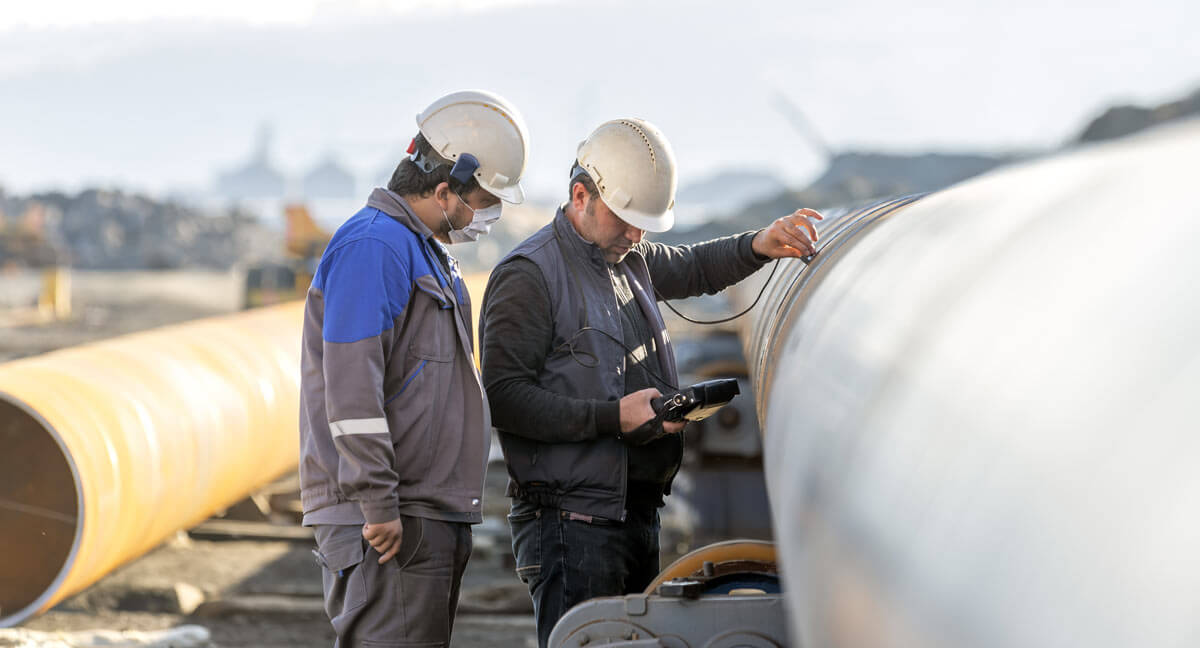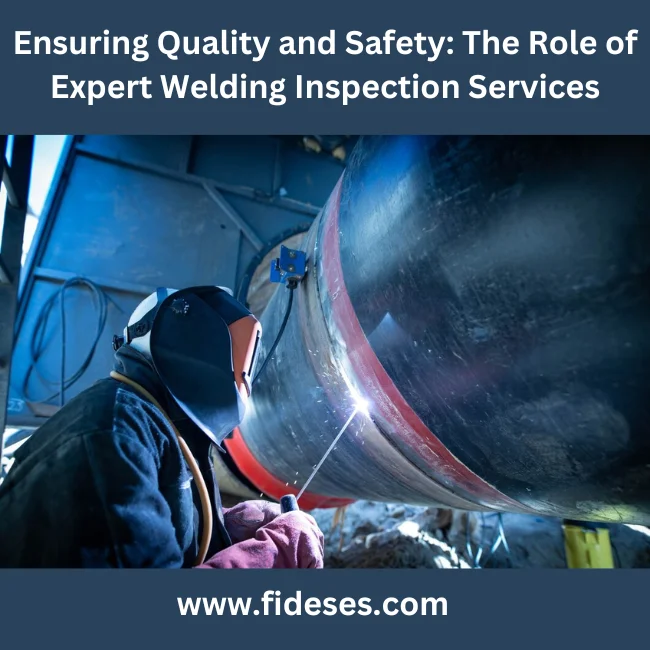The Effect of Strenuous Welding Inspection on Industry Standards: Encouraging Safety, Integrity, and Compliance Across Numerous Markets
The role of rigorous welding evaluation is progressively recognized as an essential part in boosting market standards, where security, integrity, and compliance take precedence across varied industries. By making certain consistency to developed standards, such as those established forth by AWS and ISO, these examinations not only alleviate risks however additionally cultivate a feeling of accountability amongst specialists. As industries advance and deal with brand-new challenges, the effects of these practices may extend past mere conformity. What improvements might we anticipate in welding methods as the demand for top quality and safety and security heightens?
Relevance of Welding Examinations
Identifying the critical function of welding evaluations in maintaining high quality and safety requirements, market specialists focus on these assessments to guarantee structural integrity. Welding evaluations function as an important checkpoint in the fabrication procedure, determining flaws that can jeopardize the durability and safety of bonded frameworks. By methodically evaluating welds, assessors can discover issues such as incomplete penetration, porosity, and cracks, which may not be noticeable to the nude eye.
The significance of these examinations expands beyond plain compliance; they are vital for securing lives and safeguarding investments. In crucial industries such as aerospace, production, and building, a single malfunctioning weld can bring about disastrous failings, resulting in both monetary loss and human casualties. Therefore, executing strenuous inspection methods minimizes these dangers and enhances total task integrity.
Moreover, constant welding examinations foster a culture of high quality throughout organizations, motivating welders to abide by ideal methods and keep high requirements in their job. This dedication to top quality not only enhances operational effectiveness but additionally reinforces the online reputation of business within their particular industries. Hence, welding examinations are vital in promoting safety and security, reliability, and conformity throughout various sectors.
Key Sector Standards and Rules
The framework of welding evaluations is underpinned by a robust set of sector standards and laws that control techniques throughout different sectors. Key institutions, such as the American Welding Culture (AWS) and the International Organization for Standardization (ISO), establish standards that guarantee high quality and security in welding procedures. For example, AWS D1.1 outlines crucial demands for welding steel frameworks, while ISO 3834 specifies quality demands for fusion welding.
Along with these particular requirements, sector policies like the American National Specification Institute (ANSI) and Occupational Safety And Security and Health Management (OSHA) mandates further enhance compliance by setting safety procedures and functional finest techniques. These guidelines are critical in industries such as manufacturing, aerospace, and construction, where welding integrity is paramount.
Moreover, sector-specific requirements, such as those from the American Society of Mechanical Engineers (ASME) for stress vessels, supply extra layers of analysis to guarantee that welds meet rigorous security and efficiency standards. Adherence to these standards not only promotes regulatory compliance but also fosters a society of top quality and integrity throughout the welding industry, ultimately securing public well-being and boosting operational performance.

Benefits of Conformity and Reliability
Regularly adhering to sector standards and laws in welding inspections returns substantial benefits, boosting total reliability and performance. The primary advantage is the assurance of high quality in welded joints, which straight adds to the safety of frameworks and tools. Conformity with see this website well-known criteria decreases the threat of failure and devastating incidents, thereby securing both human life and valuable possessions.
Furthermore, organizations that prioritize extensive welding assessments promote a culture of responsibility and professionalism and trust. This commitment not only bolsters the online reputation of the business however additionally instills self-confidence in stakeholders and customers concerning the honesty of items and services. Trustworthy welding processes cause minimized expenses connected with rework, repair work, and potential legal responsibilities stemming from subpar craftsmanship.
Furthermore, preserving compliance with sector standards promotes smoother governing interactions, as companies can conveniently show adherence to essential protocols (Welding Inspection Gilbert Arizona). This proactive strategy can lead to helpful partnerships and possibilities within the industry, along with access to brand-new markets
Obstacles in Welding Examination
Browsing the complexities of welding evaluation presents a myriad of difficulties that can impede conformity with sector criteria. One substantial obstacle is the variability in inspection techniques and innovations. Various sectors might use diverse approaches, bring about incongruities in the evaluation of weld high quality. In addition, the lack of standardized training for inspectors can cause different interpretations of examination requirements, which may jeopardize safety and reliability.
Another difficulty exists in the availability of advanced assessment tools - Welding Inspection Gilbert Arizona. While innovations such as ultrasonic screening and radiography can boost detection capacities, their implementation might be restricted by cost or schedule, especially in smaller sized procedures. This variation can lead to a reliance on much less efficient evaluation methods, boosting the risk of undetected flaws
In addition, the busy nature of modern manufacturing often pressures assessors to prioritize rate over thoroughness, possibly forgeting essential flaws. Last but not least, regulative compliance can be discouraging as a result of the progressing nature of industry requirements, leaving companies struggling to stay on top of the most recent requirements. These challenges demand constant enhancement in evaluation methods to make certain the stability of bonded frameworks throughout various sectors.
Future Trends in Welding Practices
Emerging innovations and advancing methodologies Click Here are readied to transform welding techniques in the coming years. Developments in automation, such as robotic welding systems, are gaining traction, boosting precision and effectiveness while reducing human error. These systems will not just quicken production however additionally help with constant quality assurance, attending to some of the obstacles dealt with in hand-operated welding.
Additionally, the combination of artificial knowledge (AI) and device discovering into welding processes is poised to revolutionize examination and tracking. Real-time data analytics will certainly enable anticipating maintenance, enabling aggressive interventions that reduce downtime and boost security. Furthermore, enhanced reality (AR) and online fact (VR) technologies are coming to be crucial in training welders, giving immersive experiences that improve skill advancement without the risks connected with traditional methods.
Sustainability is also a vital pattern, as sectors look for greener techniques. The fostering of green materials and techniques, along with energy-efficient machinery, will likely come to be conventional. As industries adjust to these modifications, the emphasis will certainly move towards higher compliance with security and environmental regulations, ensuring that welding techniques not just meet present standards but likewise lead the way for a much safer and even more sustainable future.

Verdict
To conclude, strenuous welding inspections significantly boost industry standards by making certain safety, dependability, and compliance throughout numerous markets. By systematically determining issues and sticking to developed standards, these inspections minimize risks linked with architectural failings. The promo of liability amongst welders brings about better outcomes, fostering trust fund within neighborhoods. As markets continue to focus on over at this website functional integrity, the importance of thorough evaluations will just enhance, ultimately benefiting organizations and culture at big.
The function of rigorous welding examination is significantly identified as an essential component in enhancing industry criteria, where reliability, security, and compliance take priority across varied markets. Hence, welding inspections are crucial in promoting safety, reliability, and conformity throughout numerous sectors.
Key organizations, such as the American Welding Culture (AWS) and the International Company for Standardization (ISO), establish guidelines that make certain quality and safety in welding operations. AWS D1.1 details necessary requirements for welding steel structures, while ISO 3834 specifies top quality needs for combination welding.
In verdict, rigorous welding inspections considerably boost market requirements by making certain security, reliability, and compliance throughout different sectors.
Comments on “Why Choose Specialist Welding Inspection Gilbert Arizona for Your Projects?”